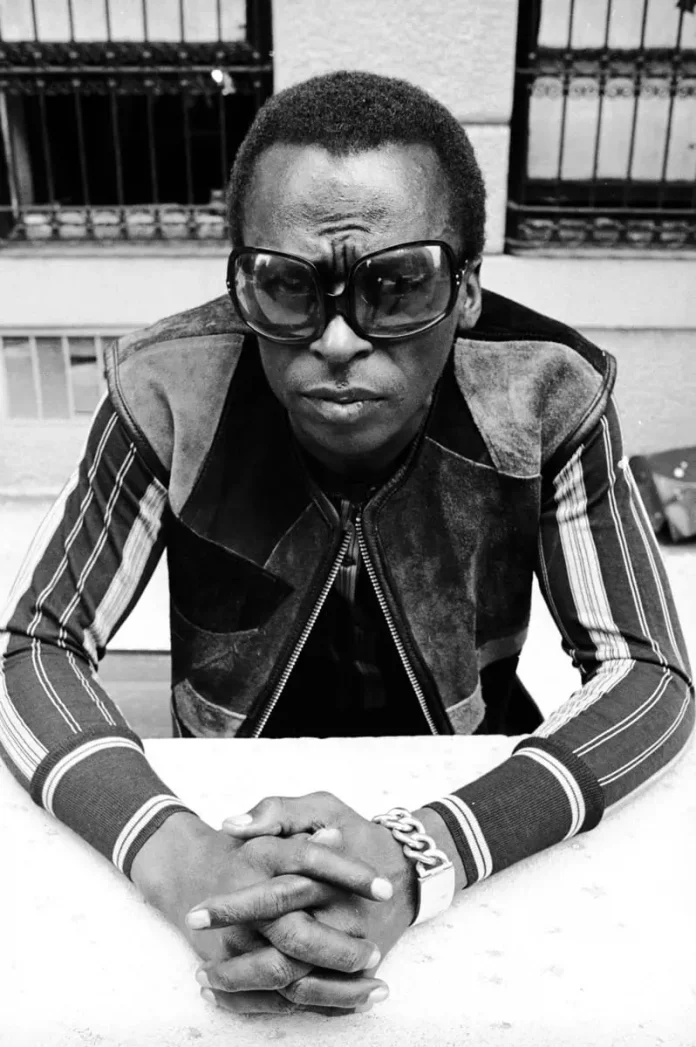As an unashamed Miles freak I’ve always felt that even if he stood on stage blowing into a bottle for half an hour I would still enjoy it. Alas, my world has been shattered, for I must forget Miles the highly inventive jazz musician, Miles our music’s emotive genius, and must talk about Miles Davis, rock musician 1971. For this is where he’s at and sadly seems happy to stay. Unlike his brief flirtation with free-form (Jazz Expo 1969), an undeniable success, his involvement with jazz-rock has been less than an aesthetic milestone (excuse the pun).
While I must admit to regular playings of ‘In A Silent Way’ and ‘Bitches Brew’, I would say that Miles’ work on these albums is a trifle superficial when compared to his earlier work with Gil Evans, his original quintet, and his more recent recordings ‘E.S.P.’ and ‘Filles de Kilimanjaro’. His Jazz Weekend performance at the Festival Hall only served to bear out my thoughts.
I caught the first house, which started at least a quarter of an hour late, because of the stubborn lack of life from an electric organ, which, despite a frantic screwdriver solo from an anonymous gentleman, remained inert and unused throughout the evening; Keith Jarrett had to concentrate on electric piano.
Aurally it was a typical Miles set, no words just music; but then we have come to accept his lack of verbal communication with his audience. However, it would have been more than acceptable for someone to have told the audience who the musicians were, for no personnel was listed in the programme. For the record, the line-up consisted of Gary Bartz (alto & soprano), Keith Jarrett (electric piano), Mike Henderson (bass guitar), Leon Chancier (drums), James Foreman & Don Alias (congas & assorted percussion effects) plus of course Miles with trumpet and wah-wah pedal.
The group gave an impression of having just been thrown together for the occasion (as rumour has it they were); loose wasn’t the word – ramshackle seemed more applicable. The accent was heavily on the rock rhythm section, which sounded unbelievably muddy at times, hardly surprising with a drummer as unsubtle as Chancler, two conga players and a bassist not too sure what to do with his wah-wah pedal.
The evening was saved musically by Jarrett, who is without question a brilliant pianist. Possessing a phenomenal technique, he never lets this fact override his communicative powers, and during the evening’s more tranquil moments he held the audience in the palm of his hand.
Bartz is a down-the-line player, basic but effective in the jazz-rock genre, and a musician who would benefit from a little more solo exposure than Miles gave him.
And so to the enigmatic Miles. His playing was most definitely uninspired; he rattled off short bursts of notes, punctuated by lengthy silences with just the rhythm section chugging away. When he did offer anything which could be vaguely described as a phrase, it had an uncomfortable resemblance to something one had heard on his recent albums, and Miles going through the motions is not a happy experience. His use of wah-wah pedal did not improve matters; some of the wails and moans he produced were frankly excruciating.
The continuous hour-and-a-half set ended in time-honoured fashion with the musicians strolling off two at a time, leaving Chancler to bring the proceedings to a somewhat untidy end. Nobody in the audience seemed to realise that that was it, myself included; it was that sort of night.
















